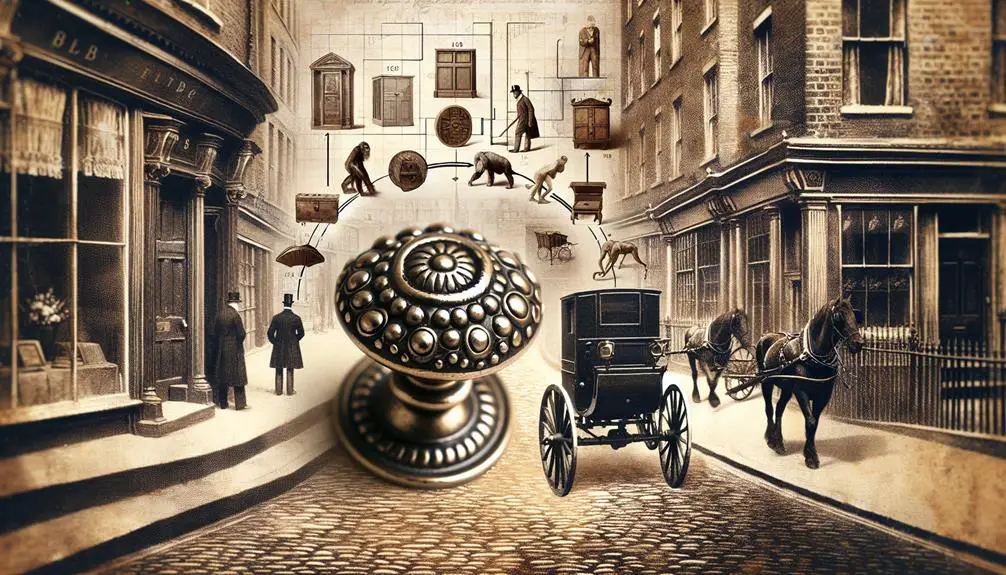Navigating the landscape of British slang is like unlocking a chest of cultural treasures, and among those, the term 'knob' stands out as both peculiar and fascinating.
You've likely encountered it in various contexts, but understanding its origins, common uses, and the nuances that differentiate it from similar slang takes a bit more insight.
As you explore the rich tapestry of British vernacular, you'll find that 'knob' not only illuminates aspects of British humor and sensibilities but also highlights regional variations and the importance of navigating sensitivities.
Unearthing the layers behind this term will offer you a deeper appreciation of British linguistic idiosyncrasies.
Origins of 'Knob

The term 'knob,' with its multifaceted connotations in British slang, traces its origins back to Middle English, embodying a rich tapestry of linguistic evolution and cultural nuance. You'll find that this word, initially benign in its early use, has navigated through the labyrinth of the English language, accruing layers of meaning and social implications. Its journey from a simple physical descriptor to a term laden with insult and innuendo is a testament to the fluid nature of language, reflecting shifts in societal attitudes and values.
In dissecting the etymology, you'll observe 'knob' first appeared in the written record around the late 14th century, derived from Middle English 'knobbe', which referred to a rounded projection or lump. This semantic foundation, grounded in the physical characteristics of objects, provided a springboard for the term's evolution into the realm of slang. As you delve deeper, it becomes evident that the transformation of 'knob' into a slang term is intertwined with historical and cultural dynamics, including changes in social mores, humor, and the propensity for euphemism in the English language.
The scholarly analysis of 'knob' reveals a linguistic fluidity, where words aren't static but are perpetually in motion, shaped by the forces of human interaction and social change. You're invited to consider how this term, once purely descriptive, has expanded its reach, encapsulating both the tangible and the intangible, the physical and the metaphorical. This evolution underscores the complexity of language, illustrating how words can serve as mirrors to the societies that use them, reflecting broader cultural patterns and shifts.
Common Uses and Contexts
Exploring the common uses and contexts of 'knob' reveals how it has permeated various facets of British culture, offering insight into its versatility and social significance. As a term that's as layered as it's colloquial, you'll find it serving multiple purposes, from playful banter to pointed insults. Its application is nuanced, reflecting both the speaker's intent and the relationship between the individuals involved. To truly grasp its multifaceted nature, consider these key contexts:
- Informal Insults: Often utilized among friends or peers, 'knob' can denote someone acting foolishly or displaying arrogance. In these instances, the term is more about teasing than causing offense.
- Character Assessments: Beyond mere jest, it can be a sharp critique of someone's behavior or personality, suggesting a lack of intelligence or an inflated ego.
- Sexual Connotations: While not always the primary implication, 'knob' carries undeniable sexual undertones, referencing male anatomy. This usage tends to be more direct and potentially offensive.
- Self-Deprecation: In a twist of self-aware humor, individuals might use 'knob' to mock their own actions or decisions, showcasing a quintessentially British penchant for self-criticism.
These contexts underscore the term's adaptability and the cultural depth it encapsulates. Understanding its application requires an appreciation of the subtleties of British humor and social dynamics, where affection and insult often intertwine. By dissecting its usage, you gain more than just a lexicon expansion; you access a window into the complexities of British social interaction and the linguistic agility that defines it.
Comparisons With Similar Slang
When comparing 'knob' to similar British slang, you'll notice a nuanced spectrum of connotations and social utilities that highlight its unique position within the vernacular landscape. 'Knob' shares thematic ground with other slang terms denoting foolishness or contemptibility, yet its usage often carries a distinct flavor of mild derision or playful insult, rather than the harsher connotations found in some of its counterparts. This subtle distinction makes 'knob' a versatile addition to the linguistic toolkit of English speakers in the UK, capable of expressing a range of sentiments from genuine annoyance to affectionate teasing.
| Term | Connotation | Typical Context |
|---|---|---|
| Knob | Mildly derogatory, playful | Casual, often among friends |
| Git | Harsher, more contemptuous | Somewhat informal, can be serious |
| Prat | Foolish, lacking judgement | Informal, often light-hearted |
This table elucidates the nuanced differences between 'knob' and similar terms. While 'git' suggests a stronger level of disapproval and 'prat' implies foolishness, 'knob' occupies a middle ground. It's this very versatility that endears it to speakers, allowing for its use in a variety of contexts without necessarily causing offense. The term's ability to convey a range of sentiments – from mild annoyance to playful jest – without crossing into overt hostility is a testament to the sophistication and adaptability of British slang. Understanding these distinctions can enrich your comprehension of British English, enabling you to navigate its complexities with greater ease and accuracy.
Regional Variations
Having established the nuanced differences between 'knob' and its linguistic counterparts, we'll now examine how regional variations across the UK further enrich its usage and meaning. The term 'knob', while uniformly recognized across the British Isles, carries a tapestry of connotations and intensities that shift subtly from one region to another. This geographic diversity in slang reflects not just local linguistic preferences but also cultural attitudes towards humor, vulgarity, and camaraderie.
To illuminate these regional diversities, consider the following:
- In Scotland, 'knob' often leans towards a more playful, albeit cheeky, usage. It's integrated into banter with a lighter tone, albeit its meaning remains grounded in insult or jest.
- In Northern England, particularly in cities like Manchester and Liverpool, 'knob' carries a slightly harsher tone. It's employed more directly and can signify stronger disapproval or irritation, often accentuated by the local accents.
- In London and the Southeast, its usage is arguably more versatile, straddling the line between offensive and endearing depending on context. The cosmopolitan nature of the area introduces a wider acceptance of varied slang.
- In Wales, while English slang permeates, 'knob' sees less frequency compared to purely Welsh insults but is understood and used, often with a specific, localized inflection that can alter its impact.
These regional variations underscore the importance of context and cultural nuance in understanding and employing British slang effectively. They reveal not only the adaptability of the English language but also the rich tapestry of regional identities within the UK.
Navigating Sensitivities

In navigating the sensitive landscape of British slang, it's crucial to understand the fine line between humor and offense within varied social contexts. The term 'knob,' while seemingly innocuous, carries connotations that can easily straddle this boundary. Your comprehension of its usage isn't just about linguistic mastery but also about cultural sensitivity and social acumen.
Primarily, you must recognize the duality of 'knob' as both a colloquial term and a potential slur. Its employment often hinges on the relationship between the speaker and the listener, as well as the existing dynamic. Among friends, its usage might be perceived as jestful banter, devoid of any malintent. Conversely, in more formal or unfamiliar settings, the term could be seen as disrespectful or derogatory, leading to discomfort or offense.
Moreover, it's imperative to consider the broader socio-cultural implications of slang. The use of 'knob' is rooted in specific cultural understandings and attitudes towards sexuality and insult. Your awareness of these nuances is essential in avoiding unintended implications or misunderstandings.
Furthermore, the evolving nature of language means that the perception of slang terms like 'knob' can shift over time. What was once deemed acceptable in casual conversation may become increasingly sensitive or problematic. Regularly updating your understanding of current linguistic norms and societal attitudes is thus vital.
Frequently Asked Questions
How Has the Usage of "Knob" Evolved in Online Communities and Digital Communication, Particularly in Social Media and Gaming Forums?
In online communities and digital communication, you've seen "knob" evolve to express disdain or ridicule, especially in social media and gaming forums. It's become a versatile insult, reflecting broader shifts in digital language culture.
Are There Any Notable Instances Where the Term "Knob" Has Been Used in Popular Movies, Television Shows, or Books That Significantly Impacted Its Popularity or Understanding?
You're exploring if "knob" has been spotlighted in media, altering its perception. Evidently, when films or TV incorporate such terms, they often cement their place in modern lexicon, influencing both usage and societal understanding.
How Do Non-Native English Speakers Perceive the Use of "Knob" in British Slang, and What Are Common Misconceptions or Confusions Surrounding Its Meaning?
You might find non-native English speakers often misunderstand 'knob' in British slang, confusing its vulgarity or missing its humor. It's common to misinterpret its usage, leading to awkward or humorous situations unintentionally.
In What Ways Has the Slang Term "Knob" Been Adopted or Adapted in Professional or Formal Settings Without Causing Offense or Misunderstanding?
In professional settings, you'll find 'knob' subtly integrated, often humorously or with euphemisms, to lighten discussions without causing offense. This careful balance avoids misunderstandings by relying on shared cultural or contextual knowledge among participants.
Can the Use of "Knob" in Humor or Comedy Transcend Cultural Barriers, or Is It Largely Misunderstood by Audiences Unfamiliar With British Slang?
You might find that humor involving slang can cross cultural barriers if it's presented with context. However, without explanation, it's often misunderstood by those not familiar with the specific linguistic nuances.
Conclusion
In summation, the term 'knob' occupies a distinctive niche within British colloquial discourse, straddling the realms of humor and offense with adept fluidity. Its etymological roots and regional variations enrich its semantic landscape, offering insights into cultural attitudes towards propriety and vulgarity.
When navigating its usage, a keen sensitivity towards context and audience is paramount. This linguistic voyage underscores the intricate dance between language and societal norms, illuminating the nuanced ways in which words shape, and are shaped by, the contours of human experience.







